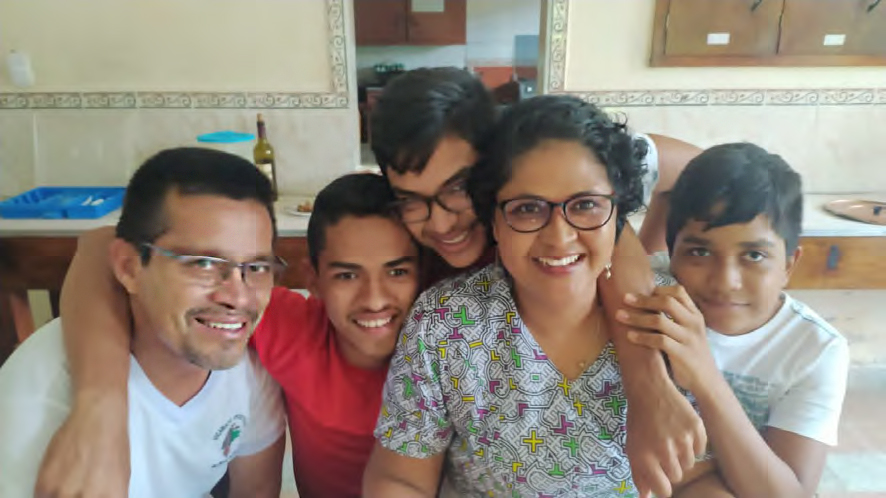The vicariate of San José del Amazonas lies in the far north of Peru, in the Amazon rainforest, close to the border with Colombia and Brazil. This is a remote area with no roads, where the main routes of travel are along the major rivers like the Amazon and the Napo and their tributaries. Most of the villages and settlements lie scattered throughout the rainforest, far from the only city in the region, the capital Iquitos. Needless to say, it is not easy to obtain basic products and services. The state is practically absent here, levels of education and healthcare are among the lowest in the entire country and there is a great sense of insecurity caused by drug trafficking and even human trafficking.
Here in this frontier forest region, forgotten and beset with problems, 59 Catholic lay missionaries are helping and supporting the 14 priests of the Vicariate in their pastoral ministry to the indigenous population in a territory the size of Ireland and Portugal combined. The missionaries are from many different countries – Mexico, Poland, Canada, Colombia, Spain, Brazil and India. There are also Peruvian missionaries helping with the pastoral outreach in the area.
The international Catholic pastoral charity and pontifical foundation Aid to the Church in Need (ACN International) has been helping their work here for over 25 years. But right now, as the Bishop of the Vicariate of San José, Mgr José Javier Travieso Martín explains, they are going through an extremely critical economic crisis, worsened by the COVID-19 pandemic.
And so ACN has once again renewed its support for the missionaries in this extremely poor region, “where the people not only cannot contribute anything to the support of their Church, but indeed very often need support themselves, as we were able to see once again during the pandemic, which continues to afflict us in this land”, the bishop explains in his letter to ACN. The reality is that the healthcare system “has been abandoned” and the people “left to their fate”, he continues.
Thanks to the help of ACN, it was possible to cover the basic food needs of 20 of the missionaries during 2020. Today there are another 14 religious sisters and seven lay missionaries who need our support, especially for basic necessities, including food and healthcare.
The vicariate has 16 mission outposts within its territory. In addition to a leprosy centre, a hospital, 16 healthcare centres on the Rio Napo, four schools and two boarding schools, and two rehabilitation centres for the disabled. The missionaries are responsible for running the parishes and mission stations and also visit dozens of outlying communities. Owing to the shortage of priests in the region, they also preside at Liturgies of the Word in the community, help train local catechists and give catechetical instruction, as well as working in the family apostolate and the pastoral outreach to the indigenous peoples. And they also care for lepers and other sick people and help in the work of educating the local children.
Gabriel Grégoire is one of the lay missionaries supported by ACN. This Canadian missionary is working in pastoral and social ministry, although on account of the pandemic is unable to undertake any of the usual work. He helps to clean and disinfect the churches and leads with the liturgical responses and liturgies when the priest is unable to be present because he is visiting other communities. He also sits on the Vicariate’s Finance Commission and helps with the Legion of Mary, visiting the sick in their homes and various other centres to pray with the people.
Another Canadian missionary working with Gabriel is Alain Lacroix. He is in charge of a mechanical workshop set up by the Vicariate in Iquitos and also helps maintain the vehicles for the mission in Tamshiyac. And at the same time he helps anyone who needs help with their vehicles and is able to offer employment to people who come asking for work.
There are also missionary families, like the family of Antonio Romero, who, together with his wife Mónica Adriana and their three children, has come here from Mexico to help. He also explains to ACN how everything has changed so much on account of Covid and how all his work now is overshadowed by the pandemic. “There are the calls for support and counsel at the death of a family member, the sickness of others, knowing there is no medication, not even paracetamol or medical alcohol; the shortages of food, the fact that oxygen, which was once pure and free in the rainforest, we now have to buy at a cost of over 3500 soles for 10 m³ so there are people with a family member dying who can find no one to lend, hire or sell them an oxygen cylinder… and then afterwards trying to get it filled – which is another endless saga…”
Another of the lay missionaries being helped by ACN is a Polish woman, Dominik Szkatula, the coordinator of the pastoral outreach to the indigenous peoples, who has been living in the country since 1982. During the time of her pastoral apostolate she has lived in a number of towns and villages, caring for lepers and defending the human rights of the indigenous peoples. After 30 years experience as a missionary and catechist, she assures us, “I know from my own experience that we can all play an active part in the saving mission of Christ. I consider myself to be extremely fortunate, because living in Amazonia you can live closer to God, and by working with the simple and humble people living here, you can actually touch Him.”





